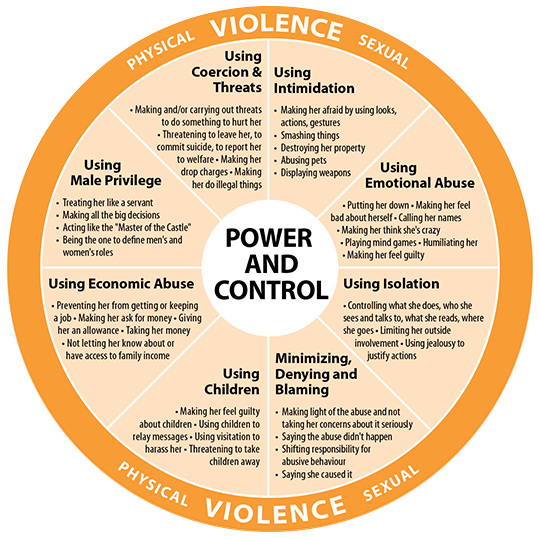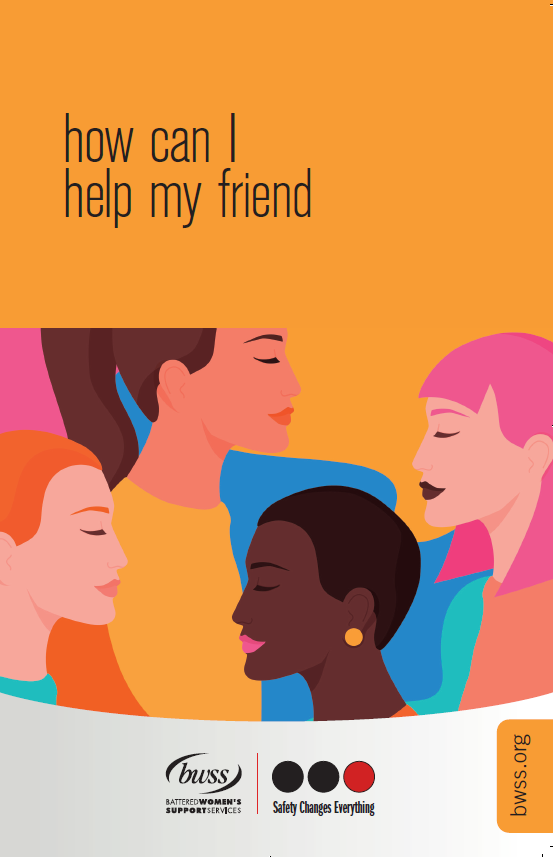How can I help my friend?
Remember
You may be the only person your friend can trust. Be attentive, believe what she says, tell her you care, and show her you are willing to help.
Reassure your friend that she does not cause the abuse. An abuser learned to use violence as a way of maintaining power and control over her long before he/she met your friend.
Tell your friend she is not alone. Abuse happens to many women, of all income and educational levels, in all social classes, in all religious and ethnic groups.
Give your friend information about BWSS. Our Crisis and Intake line number is 1.855.687.1868 and our website is bwss.org.
Help your friend with her self-esteem. Tell her what you admire about her; why you value her as a friend; what are her strengths and special qualities.
Support her emotions. Fear, anger, hope, grief in the loss of her relationships, etc.
Support her children’s emotions. They need support for their feelings, to know the reality of what is going on, to know they are not to blame.
Physical safety is the first priority. Women frequently minimize the violence because abuse usually gets worse over time. Ignoring the abuse is dangerous. Explain this to your friend and help her to make an emergency safety plan by obtaining transition house phone numbers and discussing safe places or people she knows she can go to considering police and legal protection.
If she is not ready at this point to make major changes in her life, do not take your friendship away from your friend. Your support may be what will make it possible for her to act at a later date. Isolation is often the earliest tactic abusive partners use so maintaining connection(s) is vital to safety.
Help with Children and other Responsibilities. Women often are the primary caretakers of children/elders/community and often have other paid/unpaid work responsibilities resulting in a heavy load to carry so think of ways you can help with the load and offer practical help like childcare, ride to work/home, grocery shopping.
Be supportive and willing to listen
Let your friend know that you believe what she has told you — chances are; the situation is worse than she is letting on.
Offer to accompany her to the police, transition house, or any other place she is frightened to approach for help. Your presence will help her to be strong and will show her that she is not alone.
Do not fix or go into advice giving, listen and understand the multitude of emotions she is feelings that are all normal.
Allow her to decide which option is best for her. If you strongly disagree, remember that it’s her life, not yours.
Let her know that you’ll stand by her no matter what.
Encourage, but do not pressure your friend to talk about the violence. Allow her to say as much or as little as she wants in her own words.
No matter how tempting it is to bad-mouth her partner, stop yourself and try to focus on the abuse as the problem. Most women love their partners and want the violence to stop, but they want the relationship to continue.
Allow your friend to make her own decisions.
Point out different options available to your friend, and help her to evaluate each one. Your role as a friend is to support, not rescue.
Remember
You may be the only person that can see your friend through a life without violence.
Don’t give up on her — just because the decisions she makes are different from the ones you might make doesn’t mean she doesn’t want or need your support.
If she is not ready to leave at this time, please read page 1 of this brochure. People who use violence do so as a way of controlling their partners. A woman who has been assaulted may come to believe that she can have no control over her life and that her ability to make decisions is flawed. To help her feel more confident and regain control over her life: Let her know that there are no simple solutions but that change is possible.
The first step is to look after her safety.
Help make a safety plan
Remember
Abuse rarely occurs only once and usually gets worse and more frequent with time. Helping to develop a safety plan may be the best way to help your friend protect herself from further harm. And if she doesn’t use the plan this time, she may next time, or the time after that.
The important thing is to help her develop a plan which goes in logical order from the time the assault occurs (or is about to occur) until she reaches safety.
You can get more information about safety planning on our website here or by calling the BWSS Crisis and Intake Line at 1.855.687.1868.
I am not “a person.” I am this person; unique and special.
Don’t judge me as right or wrong, bad or good. I am what I am and that’s all I’ve got.
Don’t assume that your knowledge about me is more accurate than mine. You only know what I have told you. That’s only part of me.
Please hear my feelings, not just my words. Accept all of them. If you can’t, how can I?
Don’t ever think that you know what I should do. You don’t. I may be confused, but I am still the expert about me.
Don’t place me in a position of living up to your expectations. I have enough trouble with mine.
Don’t save me or try to “fix” my situation. I can do it myself. I knew enough to ask for help, didn’t I?
Increase your knowledge
Remember
The better informed you are, the better able you will be to help her.
Make a list of phone numbers of agencies and individuals who can offer services to your friend. Call BWSS for more information about these services.
Anti-Violence Centres and Transition Houses in Canada
Please refer to our Anti-Violence Centres and Transition Houses in Canada directory or call the BWSS Crisis and Intake Line at 1.855.687.1868.
Take care of yourself
Remember
There are no simple solutions for your friend. If you have a friend who is hurting, don’t ignore the
Don’t confront your friend’s partner about the violence. The partner will likely make it even more difficult for you to see your friend and could become violent towards you.
Talk with resource persons about your feelings, fears, frustrations, and reactions to the abuse. You can do this without giving away your friend’s name or betraying her confidence in any way.
BWSS receives over 18,000 requests for services annually.
BWSS Services and Programs
Crisis and Intake Line 1-855-687-1868
Counselling
Support Groups



